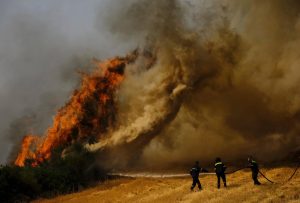The UN’s Intergovernmental Panel on Climate Change (IPCC) has issued a stark warning, noting that Climate change is widespread, rapid and intensifying. The report, which finds changes in the Earth’s climate in every region and across the whole climate system, is saying that we now hitting the limit of when useful action is going to be effective in order to reverse the cycle, Alberto Troccoli in Australia, managing director of World Energy & Meteorology Council at the School of Environmental Studies at the University of East Anglia in Norwich, told New Europe via a teleconference on August 11. “But, as you know, what we have committed in terms of emissions is already there. There is an inertia in the system and the inertia can continue for a few decades before things reverse so what we can do is to anticipate a bit the process of reversing which will happen in say 20-30 years. Obviously, there is a justification and things that it’s kind of expected because the temperature is going up and emissions are going up despite Covid and therefore this is all expected from the warning climate,” Troccoli said in an interview.
The UK in partnership with Italy will host the 26th UN Climate Change Conference of the Parties (COP26) in Glasgow on October 31 – November 12. “They are preparing very well but on the other hand, from a technological perspective it may be a bit tricky because it’s going to be mixed, I think physical and online. Hopefully they will reach an agreement even if they have to deal remotely for this kind of tough conversation,” he said.
The UK government says face-to-face meetings are vital for the success of negotiations. “There was actually some commentary about the guy in charge of the UK committee there, the one he is presiding, saying he is travelling too much which is against the fact that we should use less fossil fuels,” Troccoli said, laughing, referring to UK minister Alok Sharma, who is in charge of preparations for the COP 26 meeting and was earlier criticised for taking 25 flights in three months.
According to Troccoli, COP26 is expected to be a major milestone in terms of international agreements. “It’s similar to the Paris Agreement, that kind of setting the pace and now with the US onboard and China also onboard, there are only few countries, the major country I guess is Australia which is not committing to net zero by 2050,” the Australian-based expert said. “Yes, so feeling the pain,” Troccoli said, laughing.
Asked whether recent wildfires in Greece, Turkey, Italy and Algeria, are the result of climate change, he said the standard response is that we cannot associate a single event to climate change and that’s still the case. “The fact is that we are seeing this event more and more often but the historical climate is not moving as fast as we should in order to, it’s just the time that is passing, we would need longer history and longer statistics to work out if that’s out of the band or not and we are not in that position yet because the kind of separation between, for example, high fossil fuel emissions and what is kind of standard or higher, is slightly higher is still there, the separation starts to appear in the scenarios, or the projections in about 20 years,” Troccoli said.
“That’s when they start to diverge and that’s when you clearly see the effect of enhanced emissions but the fact remains that we are seeing more and more of this event and even the floods in Germany, the heatwave in Canada and the fires in California. The fires in California are now kind of the norm and so, the fact these are increasing is certainly pointing towards the relationship with global warming. It’s very difficult to say, if you think about the reverse why we don’t see less of this if there is no connection,” the Australia-based meteorologist said.

“One thing that it is being shown scientifically which is becoming very clear as well but it’s already been established is that precipitations are becoming more intense and localized,” Troccoli said, adding, “It has to do that with fact that heating the environment you get all this evaporation happening and the process is much faster than it would normally be without the warming so you accelerate all this and then the atmosphere cannot contain all this water vapor and then it drops very quickly and that’s happening with all this flash flooding”.
follow on twitter @energyinsider
-------------------------------------------
By: kostisg
Title: As UN issues stark climate warning, wildfires spread across Med region
Sourced From: www.neweurope.eu/article/as-un-issues-stark-climate-warning-wildfires-spread-across-med-region/
Published Date: Fri, 13 Aug 2021 17:15:58 +0000
Read More
 UK PoliticsWorld PoliticsVideosPrivacy PolicyTerms And Conditions
UK PoliticsWorld PoliticsVideosPrivacy PolicyTerms And Conditions
